Analysis: Islamic Banks' Immunity from the 2008 Financial Crisis
VerifiedAdded on 2022/12/14
|30
|9603
|461
Report
AI Summary
This report examines the factors that allowed Islamic banks to withstand the 2008 financial crisis, unlike many conventional financial institutions. The study highlights the adherence to Sharia law as a primary protective measure, emphasizing the importance of asset-based financing and equity-based funding, while also noting the prohibition of interest (riba) as a key differentiator. The analysis contrasts Islamic banking practices, such as profit and loss sharing, with the conventional banking system's reliance on interest-based lending and subprime mortgages, which contributed to the crisis. The report provides an overview of Islamic finance principles, including Musharaka, Mudaraba, Murabaha, and Ijara, and discusses the importance of corporate governance in maintaining the stability of Islamic banks. The conclusion underscores the resilience of Islamic banks, despite the global impact of the financial crisis, and offers recommendations for future research and improvements in the sector.
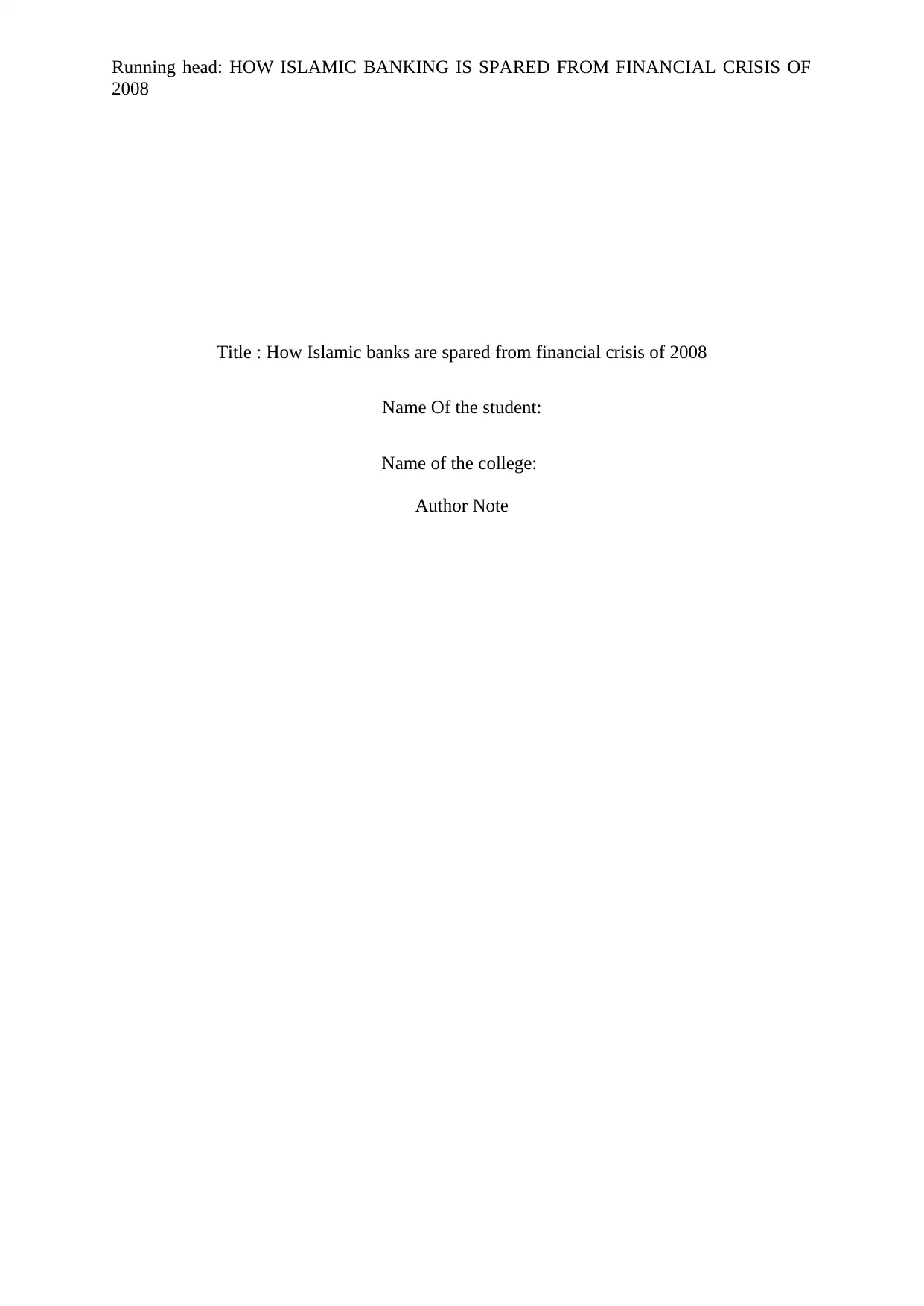
Running head: HOW ISLAMIC BANKING IS SPARED FROM FINANCIAL CRISIS OF
2008
Title : How Islamic banks are spared from financial crisis of 2008
Name Of the student:
Name of the college:
Author Note
2008
Title : How Islamic banks are spared from financial crisis of 2008
Name Of the student:
Name of the college:
Author Note
Paraphrase This Document
Need a fresh take? Get an instant paraphrase of this document with our AI Paraphraser
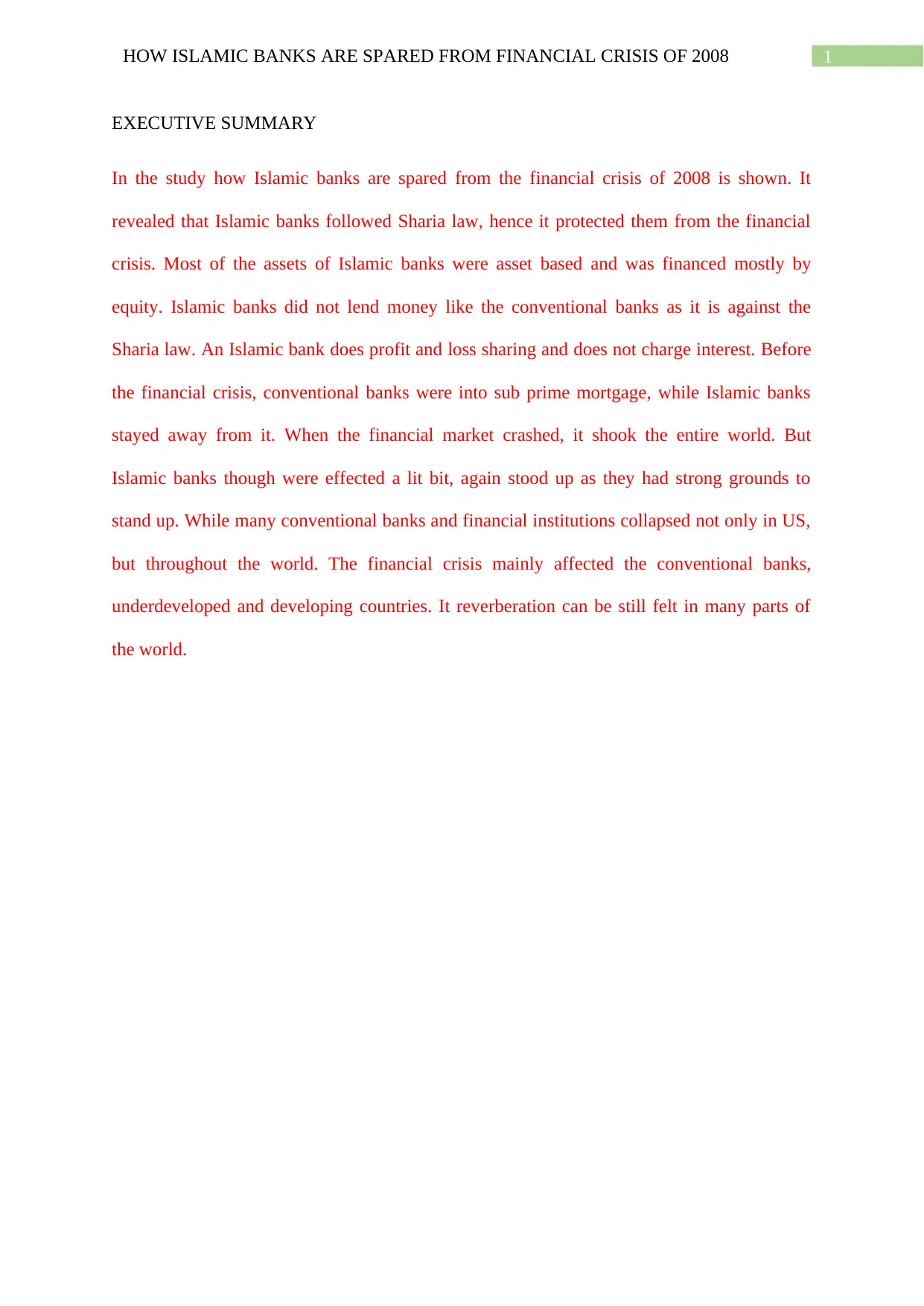
1HOW ISLAMIC BANKS ARE SPARED FROM FINANCIAL CRISIS OF 2008
EXECUTIVE SUMMARY
In the study how Islamic banks are spared from the financial crisis of 2008 is shown. It
revealed that Islamic banks followed Sharia law, hence it protected them from the financial
crisis. Most of the assets of Islamic banks were asset based and was financed mostly by
equity. Islamic banks did not lend money like the conventional banks as it is against the
Sharia law. An Islamic bank does profit and loss sharing and does not charge interest. Before
the financial crisis, conventional banks were into sub prime mortgage, while Islamic banks
stayed away from it. When the financial market crashed, it shook the entire world. But
Islamic banks though were effected a lit bit, again stood up as they had strong grounds to
stand up. While many conventional banks and financial institutions collapsed not only in US,
but throughout the world. The financial crisis mainly affected the conventional banks,
underdeveloped and developing countries. It reverberation can be still felt in many parts of
the world.
EXECUTIVE SUMMARY
In the study how Islamic banks are spared from the financial crisis of 2008 is shown. It
revealed that Islamic banks followed Sharia law, hence it protected them from the financial
crisis. Most of the assets of Islamic banks were asset based and was financed mostly by
equity. Islamic banks did not lend money like the conventional banks as it is against the
Sharia law. An Islamic bank does profit and loss sharing and does not charge interest. Before
the financial crisis, conventional banks were into sub prime mortgage, while Islamic banks
stayed away from it. When the financial market crashed, it shook the entire world. But
Islamic banks though were effected a lit bit, again stood up as they had strong grounds to
stand up. While many conventional banks and financial institutions collapsed not only in US,
but throughout the world. The financial crisis mainly affected the conventional banks,
underdeveloped and developing countries. It reverberation can be still felt in many parts of
the world.
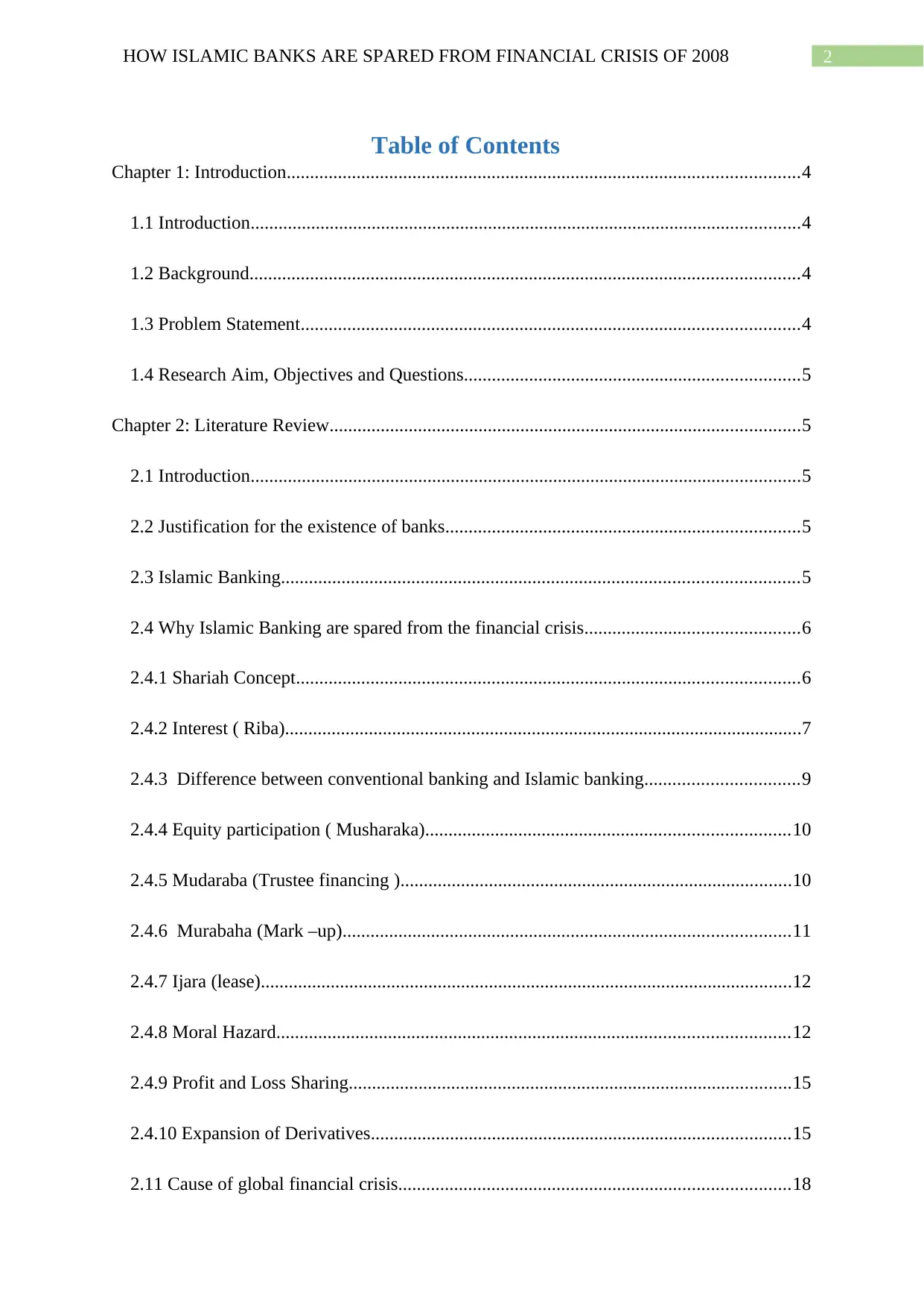
2HOW ISLAMIC BANKS ARE SPARED FROM FINANCIAL CRISIS OF 2008
Table of Contents
Chapter 1: Introduction..............................................................................................................4
1.1 Introduction......................................................................................................................4
1.2 Background......................................................................................................................4
1.3 Problem Statement...........................................................................................................4
1.4 Research Aim, Objectives and Questions........................................................................5
Chapter 2: Literature Review.....................................................................................................5
2.1 Introduction......................................................................................................................5
2.2 Justification for the existence of banks............................................................................5
2.3 Islamic Banking...............................................................................................................5
2.4 Why Islamic Banking are spared from the financial crisis..............................................6
2.4.1 Shariah Concept............................................................................................................6
2.4.2 Interest ( Riba)...............................................................................................................7
2.4.3 Difference between conventional banking and Islamic banking.................................9
2.4.4 Equity participation ( Musharaka)..............................................................................10
2.4.5 Mudaraba (Trustee financing )....................................................................................10
2.4.6 Murabaha (Mark –up)................................................................................................11
2.4.7 Ijara (lease)..................................................................................................................12
2.4.8 Moral Hazard..............................................................................................................12
2.4.9 Profit and Loss Sharing...............................................................................................15
2.4.10 Expansion of Derivatives..........................................................................................15
2.11 Cause of global financial crisis....................................................................................18
Table of Contents
Chapter 1: Introduction..............................................................................................................4
1.1 Introduction......................................................................................................................4
1.2 Background......................................................................................................................4
1.3 Problem Statement...........................................................................................................4
1.4 Research Aim, Objectives and Questions........................................................................5
Chapter 2: Literature Review.....................................................................................................5
2.1 Introduction......................................................................................................................5
2.2 Justification for the existence of banks............................................................................5
2.3 Islamic Banking...............................................................................................................5
2.4 Why Islamic Banking are spared from the financial crisis..............................................6
2.4.1 Shariah Concept............................................................................................................6
2.4.2 Interest ( Riba)...............................................................................................................7
2.4.3 Difference between conventional banking and Islamic banking.................................9
2.4.4 Equity participation ( Musharaka)..............................................................................10
2.4.5 Mudaraba (Trustee financing )....................................................................................10
2.4.6 Murabaha (Mark –up)................................................................................................11
2.4.7 Ijara (lease)..................................................................................................................12
2.4.8 Moral Hazard..............................................................................................................12
2.4.9 Profit and Loss Sharing...............................................................................................15
2.4.10 Expansion of Derivatives..........................................................................................15
2.11 Cause of global financial crisis....................................................................................18
⊘ This is a preview!⊘
Do you want full access?
Subscribe today to unlock all pages.

Trusted by 1+ million students worldwide
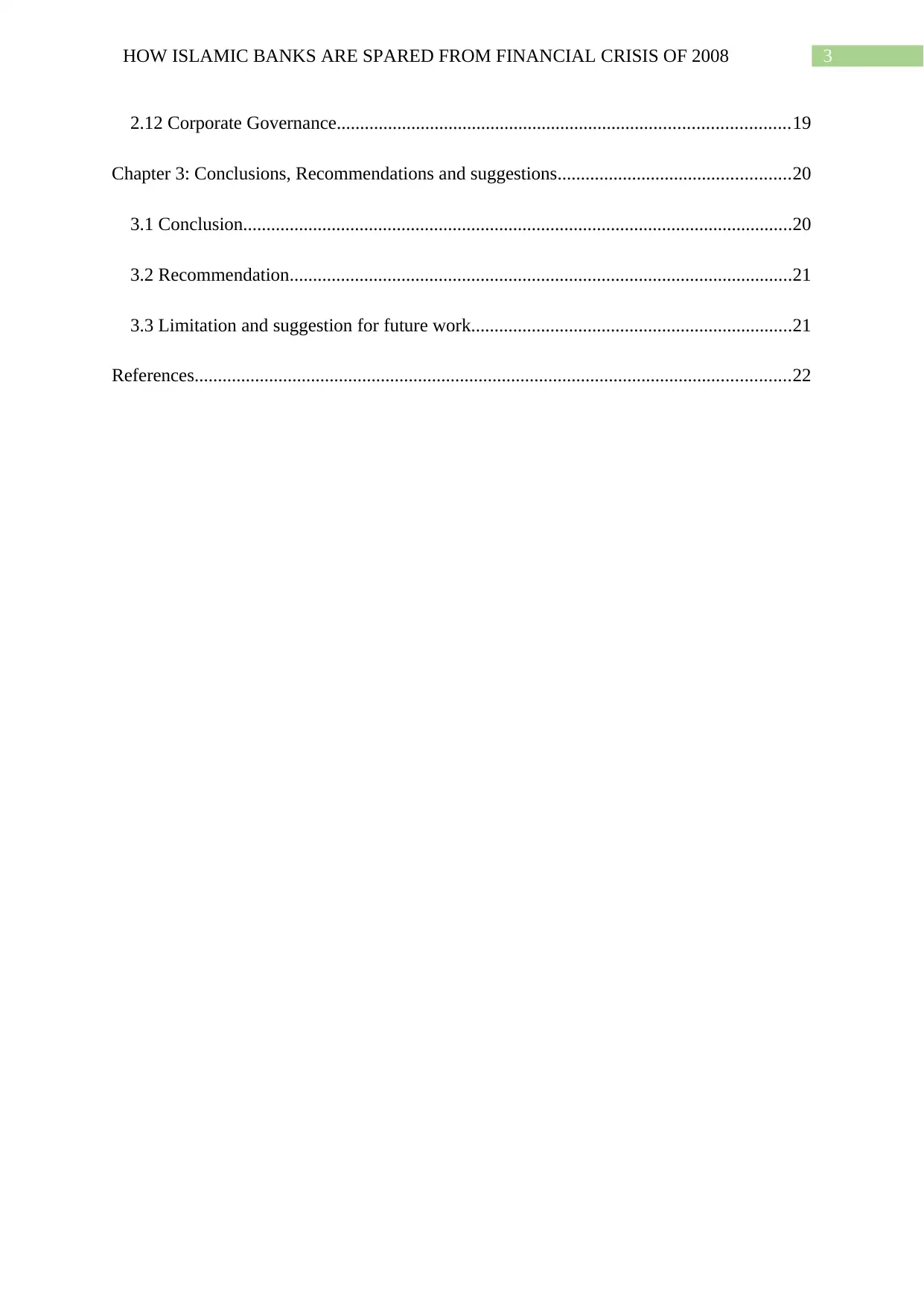
3HOW ISLAMIC BANKS ARE SPARED FROM FINANCIAL CRISIS OF 2008
2.12 Corporate Governance.................................................................................................19
Chapter 3: Conclusions, Recommendations and suggestions..................................................20
3.1 Conclusion......................................................................................................................20
3.2 Recommendation............................................................................................................21
3.3 Limitation and suggestion for future work.....................................................................21
References................................................................................................................................22
2.12 Corporate Governance.................................................................................................19
Chapter 3: Conclusions, Recommendations and suggestions..................................................20
3.1 Conclusion......................................................................................................................20
3.2 Recommendation............................................................................................................21
3.3 Limitation and suggestion for future work.....................................................................21
References................................................................................................................................22
Paraphrase This Document
Need a fresh take? Get an instant paraphrase of this document with our AI Paraphraser
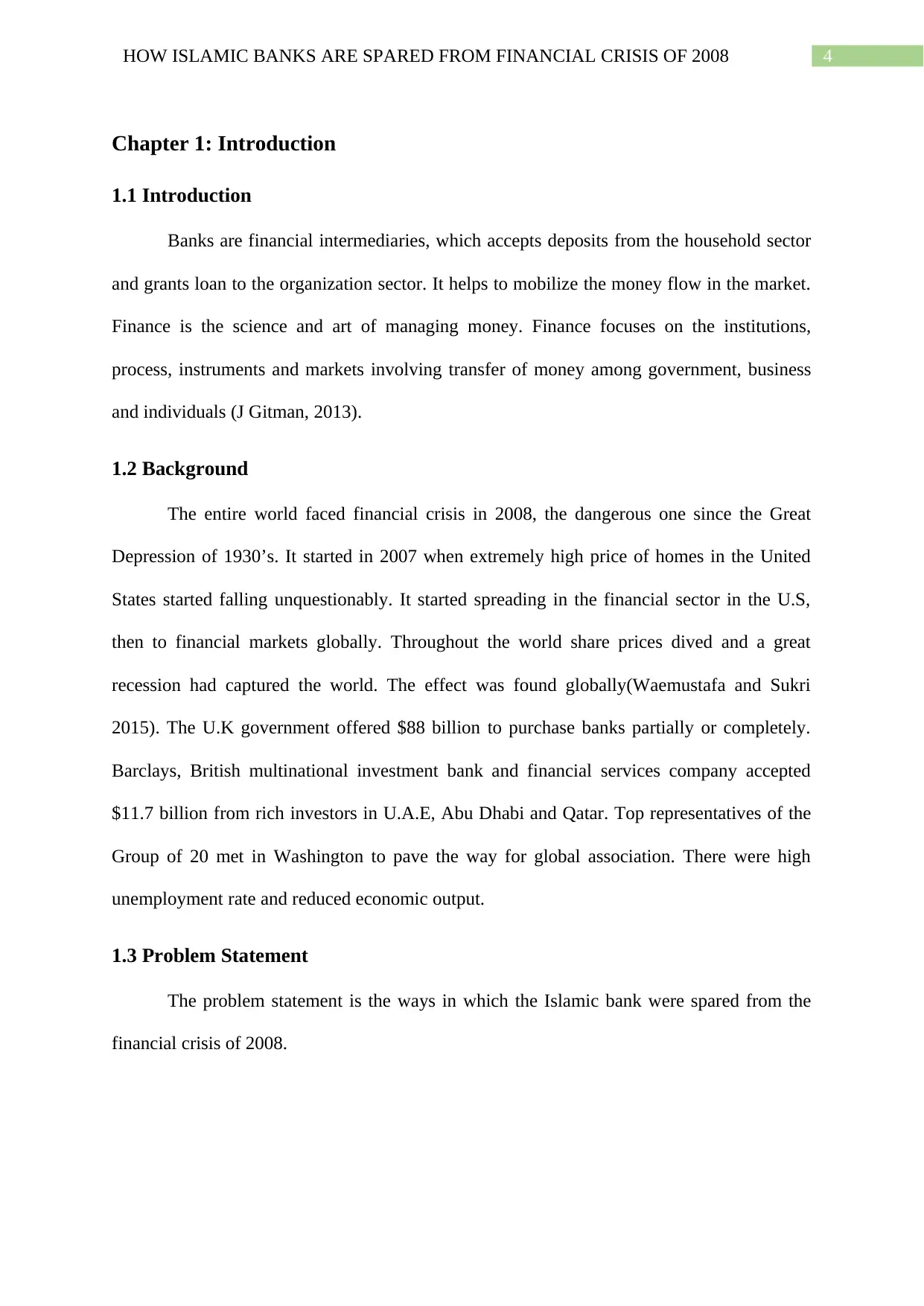
4HOW ISLAMIC BANKS ARE SPARED FROM FINANCIAL CRISIS OF 2008
Chapter 1: Introduction
1.1 Introduction
Banks are financial intermediaries, which accepts deposits from the household sector
and grants loan to the organization sector. It helps to mobilize the money flow in the market.
Finance is the science and art of managing money. Finance focuses on the institutions,
process, instruments and markets involving transfer of money among government, business
and individuals (J Gitman, 2013).
1.2 Background
The entire world faced financial crisis in 2008, the dangerous one since the Great
Depression of 1930’s. It started in 2007 when extremely high price of homes in the United
States started falling unquestionably. It started spreading in the financial sector in the U.S,
then to financial markets globally. Throughout the world share prices dived and a great
recession had captured the world. The effect was found globally(Waemustafa and Sukri
2015). The U.K government offered $88 billion to purchase banks partially or completely.
Barclays, British multinational investment bank and financial services company accepted
$11.7 billion from rich investors in U.A.E, Abu Dhabi and Qatar. Top representatives of the
Group of 20 met in Washington to pave the way for global association. There were high
unemployment rate and reduced economic output.
1.3 Problem Statement
The problem statement is the ways in which the Islamic bank were spared from the
financial crisis of 2008.
Chapter 1: Introduction
1.1 Introduction
Banks are financial intermediaries, which accepts deposits from the household sector
and grants loan to the organization sector. It helps to mobilize the money flow in the market.
Finance is the science and art of managing money. Finance focuses on the institutions,
process, instruments and markets involving transfer of money among government, business
and individuals (J Gitman, 2013).
1.2 Background
The entire world faced financial crisis in 2008, the dangerous one since the Great
Depression of 1930’s. It started in 2007 when extremely high price of homes in the United
States started falling unquestionably. It started spreading in the financial sector in the U.S,
then to financial markets globally. Throughout the world share prices dived and a great
recession had captured the world. The effect was found globally(Waemustafa and Sukri
2015). The U.K government offered $88 billion to purchase banks partially or completely.
Barclays, British multinational investment bank and financial services company accepted
$11.7 billion from rich investors in U.A.E, Abu Dhabi and Qatar. Top representatives of the
Group of 20 met in Washington to pave the way for global association. There were high
unemployment rate and reduced economic output.
1.3 Problem Statement
The problem statement is the ways in which the Islamic bank were spared from the
financial crisis of 2008.
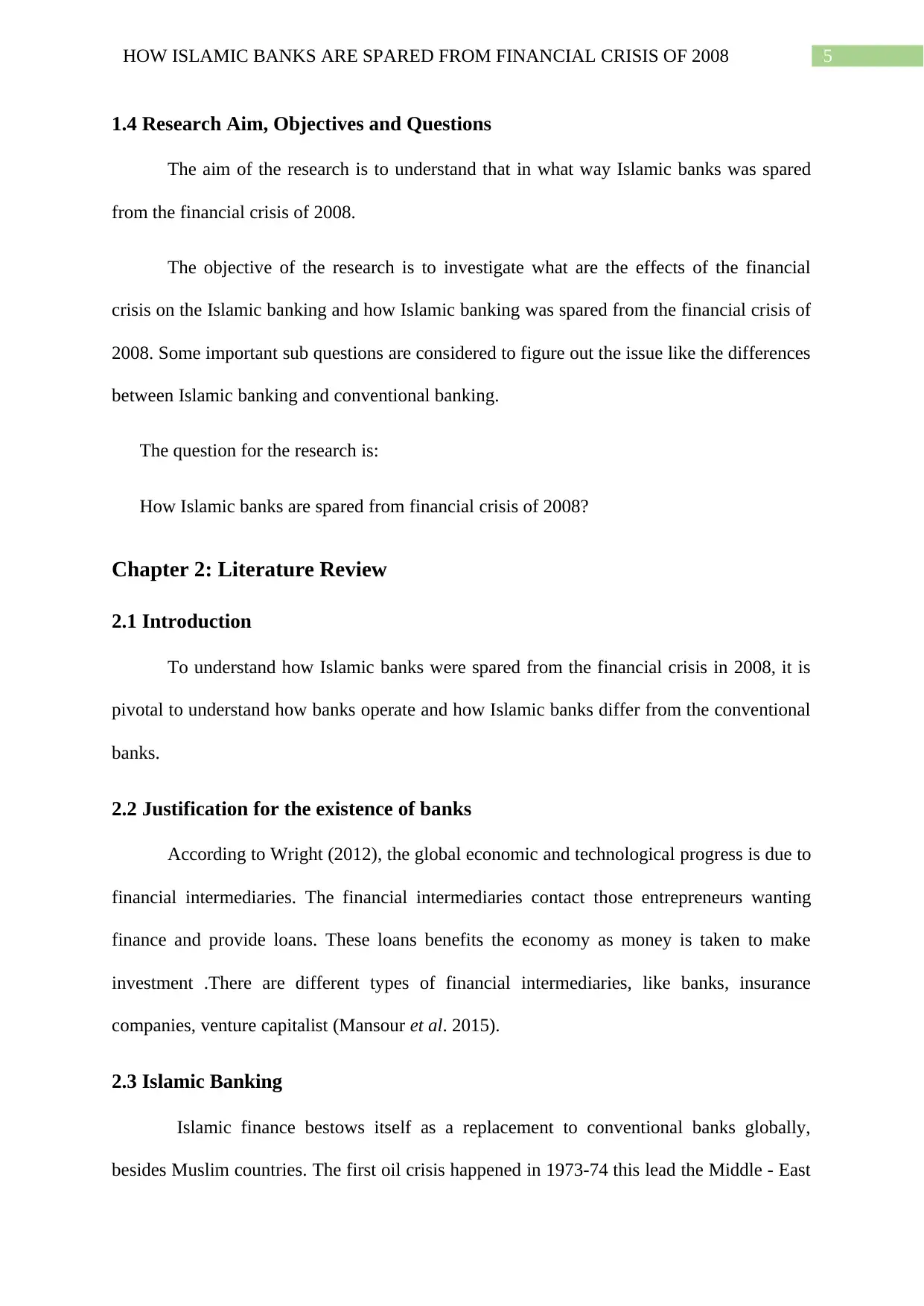
5HOW ISLAMIC BANKS ARE SPARED FROM FINANCIAL CRISIS OF 2008
1.4 Research Aim, Objectives and Questions
The aim of the research is to understand that in what way Islamic banks was spared
from the financial crisis of 2008.
The objective of the research is to investigate what are the effects of the financial
crisis on the Islamic banking and how Islamic banking was spared from the financial crisis of
2008. Some important sub questions are considered to figure out the issue like the differences
between Islamic banking and conventional banking.
The question for the research is:
How Islamic banks are spared from financial crisis of 2008?
Chapter 2: Literature Review
2.1 Introduction
To understand how Islamic banks were spared from the financial crisis in 2008, it is
pivotal to understand how banks operate and how Islamic banks differ from the conventional
banks.
2.2 Justification for the existence of banks
According to Wright (2012), the global economic and technological progress is due to
financial intermediaries. The financial intermediaries contact those entrepreneurs wanting
finance and provide loans. These loans benefits the economy as money is taken to make
investment .There are different types of financial intermediaries, like banks, insurance
companies, venture capitalist (Mansour et al. 2015).
2.3 Islamic Banking
Islamic finance bestows itself as a replacement to conventional banks globally,
besides Muslim countries. The first oil crisis happened in 1973-74 this lead the Middle - East
1.4 Research Aim, Objectives and Questions
The aim of the research is to understand that in what way Islamic banks was spared
from the financial crisis of 2008.
The objective of the research is to investigate what are the effects of the financial
crisis on the Islamic banking and how Islamic banking was spared from the financial crisis of
2008. Some important sub questions are considered to figure out the issue like the differences
between Islamic banking and conventional banking.
The question for the research is:
How Islamic banks are spared from financial crisis of 2008?
Chapter 2: Literature Review
2.1 Introduction
To understand how Islamic banks were spared from the financial crisis in 2008, it is
pivotal to understand how banks operate and how Islamic banks differ from the conventional
banks.
2.2 Justification for the existence of banks
According to Wright (2012), the global economic and technological progress is due to
financial intermediaries. The financial intermediaries contact those entrepreneurs wanting
finance and provide loans. These loans benefits the economy as money is taken to make
investment .There are different types of financial intermediaries, like banks, insurance
companies, venture capitalist (Mansour et al. 2015).
2.3 Islamic Banking
Islamic finance bestows itself as a replacement to conventional banks globally,
besides Muslim countries. The first oil crisis happened in 1973-74 this lead the Middle - East
⊘ This is a preview!⊘
Do you want full access?
Subscribe today to unlock all pages.

Trusted by 1+ million students worldwide
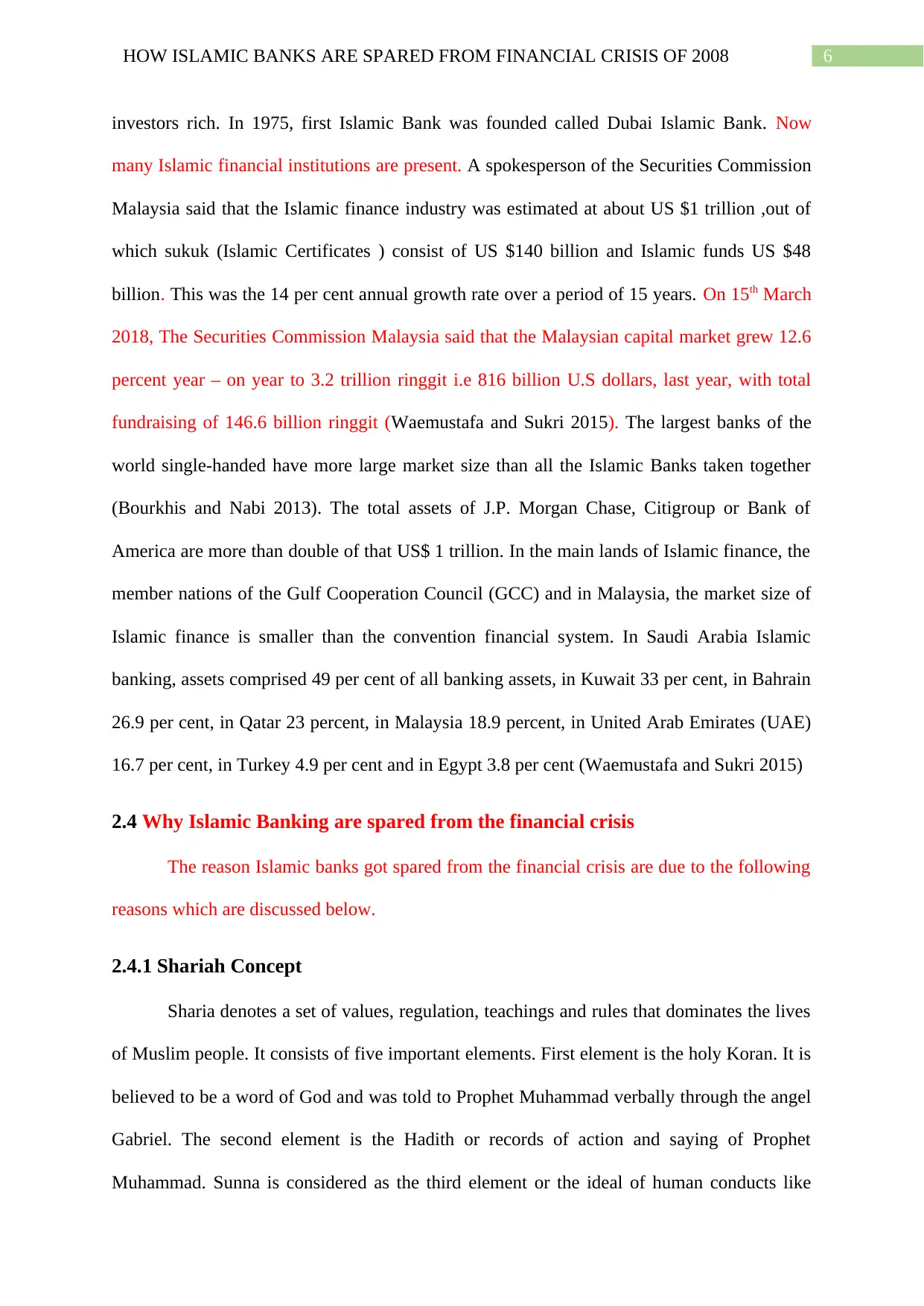
6HOW ISLAMIC BANKS ARE SPARED FROM FINANCIAL CRISIS OF 2008
investors rich. In 1975, first Islamic Bank was founded called Dubai Islamic Bank. Now
many Islamic financial institutions are present. A spokesperson of the Securities Commission
Malaysia said that the Islamic finance industry was estimated at about US $1 trillion ,out of
which sukuk (Islamic Certificates ) consist of US $140 billion and Islamic funds US $48
billion. This was the 14 per cent annual growth rate over a period of 15 years. On 15th March
2018, The Securities Commission Malaysia said that the Malaysian capital market grew 12.6
percent year – on year to 3.2 trillion ringgit i.e 816 billion U.S dollars, last year, with total
fundraising of 146.6 billion ringgit (Waemustafa and Sukri 2015). The largest banks of the
world single-handed have more large market size than all the Islamic Banks taken together
(Bourkhis and Nabi 2013). The total assets of J.P. Morgan Chase, Citigroup or Bank of
America are more than double of that US$ 1 trillion. In the main lands of Islamic finance, the
member nations of the Gulf Cooperation Council (GCC) and in Malaysia, the market size of
Islamic finance is smaller than the convention financial system. In Saudi Arabia Islamic
banking, assets comprised 49 per cent of all banking assets, in Kuwait 33 per cent, in Bahrain
26.9 per cent, in Qatar 23 percent, in Malaysia 18.9 percent, in United Arab Emirates (UAE)
16.7 per cent, in Turkey 4.9 per cent and in Egypt 3.8 per cent (Waemustafa and Sukri 2015)
2.4 Why Islamic Banking are spared from the financial crisis
The reason Islamic banks got spared from the financial crisis are due to the following
reasons which are discussed below.
2.4.1 Shariah Concept
Sharia denotes a set of values, regulation, teachings and rules that dominates the lives
of Muslim people. It consists of five important elements. First element is the holy Koran. It is
believed to be a word of God and was told to Prophet Muhammad verbally through the angel
Gabriel. The second element is the Hadith or records of action and saying of Prophet
Muhammad. Sunna is considered as the third element or the ideal of human conducts like
investors rich. In 1975, first Islamic Bank was founded called Dubai Islamic Bank. Now
many Islamic financial institutions are present. A spokesperson of the Securities Commission
Malaysia said that the Islamic finance industry was estimated at about US $1 trillion ,out of
which sukuk (Islamic Certificates ) consist of US $140 billion and Islamic funds US $48
billion. This was the 14 per cent annual growth rate over a period of 15 years. On 15th March
2018, The Securities Commission Malaysia said that the Malaysian capital market grew 12.6
percent year – on year to 3.2 trillion ringgit i.e 816 billion U.S dollars, last year, with total
fundraising of 146.6 billion ringgit (Waemustafa and Sukri 2015). The largest banks of the
world single-handed have more large market size than all the Islamic Banks taken together
(Bourkhis and Nabi 2013). The total assets of J.P. Morgan Chase, Citigroup or Bank of
America are more than double of that US$ 1 trillion. In the main lands of Islamic finance, the
member nations of the Gulf Cooperation Council (GCC) and in Malaysia, the market size of
Islamic finance is smaller than the convention financial system. In Saudi Arabia Islamic
banking, assets comprised 49 per cent of all banking assets, in Kuwait 33 per cent, in Bahrain
26.9 per cent, in Qatar 23 percent, in Malaysia 18.9 percent, in United Arab Emirates (UAE)
16.7 per cent, in Turkey 4.9 per cent and in Egypt 3.8 per cent (Waemustafa and Sukri 2015)
2.4 Why Islamic Banking are spared from the financial crisis
The reason Islamic banks got spared from the financial crisis are due to the following
reasons which are discussed below.
2.4.1 Shariah Concept
Sharia denotes a set of values, regulation, teachings and rules that dominates the lives
of Muslim people. It consists of five important elements. First element is the holy Koran. It is
believed to be a word of God and was told to Prophet Muhammad verbally through the angel
Gabriel. The second element is the Hadith or records of action and saying of Prophet
Muhammad. Sunna is considered as the third element or the ideal of human conducts like
Paraphrase This Document
Need a fresh take? Get an instant paraphrase of this document with our AI Paraphraser
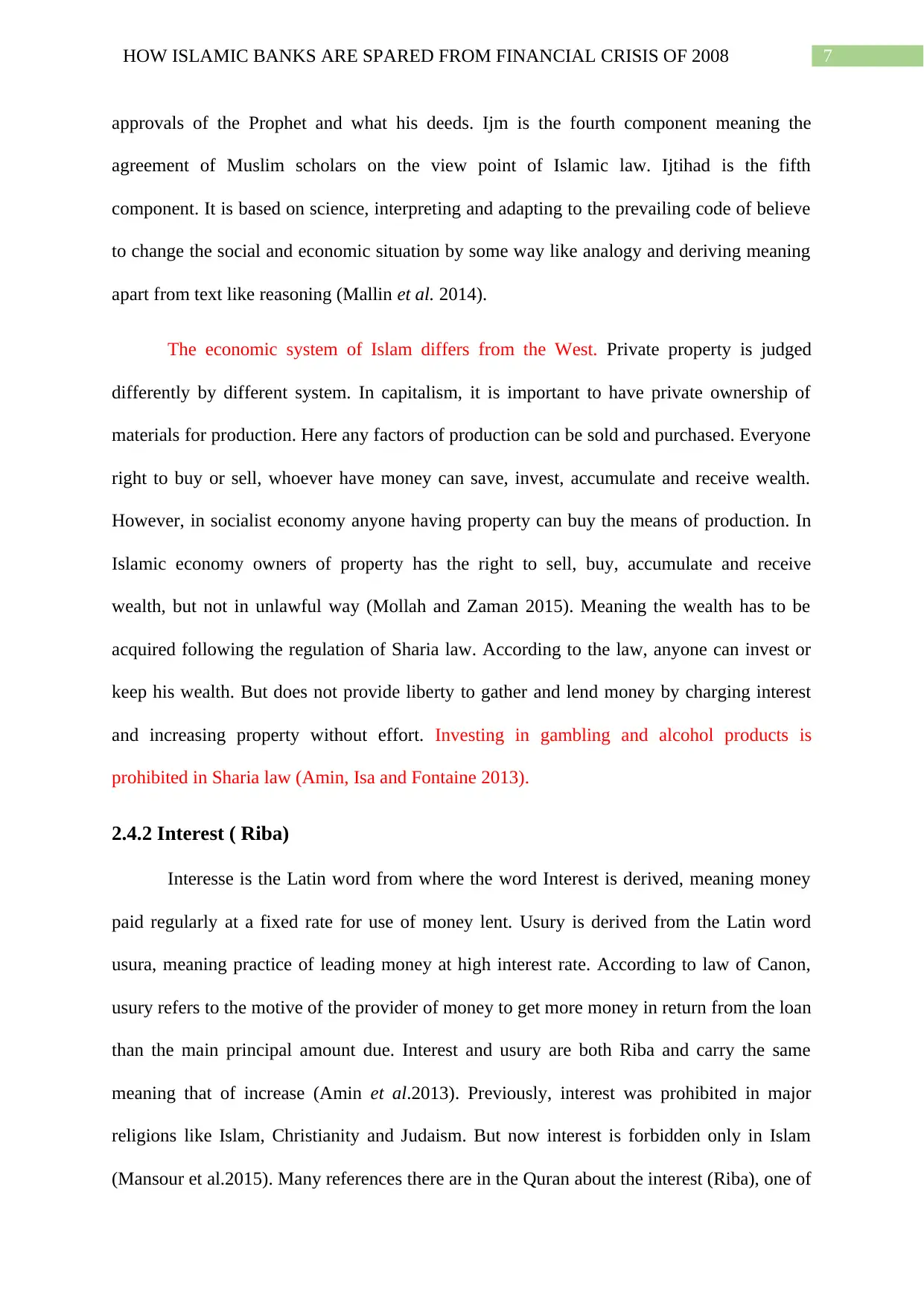
7HOW ISLAMIC BANKS ARE SPARED FROM FINANCIAL CRISIS OF 2008
approvals of the Prophet and what his deeds. Ijm is the fourth component meaning the
agreement of Muslim scholars on the view point of Islamic law. Ijtihad is the fifth
component. It is based on science, interpreting and adapting to the prevailing code of believe
to change the social and economic situation by some way like analogy and deriving meaning
apart from text like reasoning (Mallin et al. 2014).
The economic system of Islam differs from the West. Private property is judged
differently by different system. In capitalism, it is important to have private ownership of
materials for production. Here any factors of production can be sold and purchased. Everyone
right to buy or sell, whoever have money can save, invest, accumulate and receive wealth.
However, in socialist economy anyone having property can buy the means of production. In
Islamic economy owners of property has the right to sell, buy, accumulate and receive
wealth, but not in unlawful way (Mollah and Zaman 2015). Meaning the wealth has to be
acquired following the regulation of Sharia law. According to the law, anyone can invest or
keep his wealth. But does not provide liberty to gather and lend money by charging interest
and increasing property without effort. Investing in gambling and alcohol products is
prohibited in Sharia law (Amin, Isa and Fontaine 2013).
2.4.2 Interest ( Riba)
Interesse is the Latin word from where the word Interest is derived, meaning money
paid regularly at a fixed rate for use of money lent. Usury is derived from the Latin word
usura, meaning practice of leading money at high interest rate. According to law of Canon,
usury refers to the motive of the provider of money to get more money in return from the loan
than the main principal amount due. Interest and usury are both Riba and carry the same
meaning that of increase (Amin et al.2013). Previously, interest was prohibited in major
religions like Islam, Christianity and Judaism. But now interest is forbidden only in Islam
(Mansour et al.2015). Many references there are in the Quran about the interest (Riba), one of
approvals of the Prophet and what his deeds. Ijm is the fourth component meaning the
agreement of Muslim scholars on the view point of Islamic law. Ijtihad is the fifth
component. It is based on science, interpreting and adapting to the prevailing code of believe
to change the social and economic situation by some way like analogy and deriving meaning
apart from text like reasoning (Mallin et al. 2014).
The economic system of Islam differs from the West. Private property is judged
differently by different system. In capitalism, it is important to have private ownership of
materials for production. Here any factors of production can be sold and purchased. Everyone
right to buy or sell, whoever have money can save, invest, accumulate and receive wealth.
However, in socialist economy anyone having property can buy the means of production. In
Islamic economy owners of property has the right to sell, buy, accumulate and receive
wealth, but not in unlawful way (Mollah and Zaman 2015). Meaning the wealth has to be
acquired following the regulation of Sharia law. According to the law, anyone can invest or
keep his wealth. But does not provide liberty to gather and lend money by charging interest
and increasing property without effort. Investing in gambling and alcohol products is
prohibited in Sharia law (Amin, Isa and Fontaine 2013).
2.4.2 Interest ( Riba)
Interesse is the Latin word from where the word Interest is derived, meaning money
paid regularly at a fixed rate for use of money lent. Usury is derived from the Latin word
usura, meaning practice of leading money at high interest rate. According to law of Canon,
usury refers to the motive of the provider of money to get more money in return from the loan
than the main principal amount due. Interest and usury are both Riba and carry the same
meaning that of increase (Amin et al.2013). Previously, interest was prohibited in major
religions like Islam, Christianity and Judaism. But now interest is forbidden only in Islam
(Mansour et al.2015). Many references there are in the Quran about the interest (Riba), one of
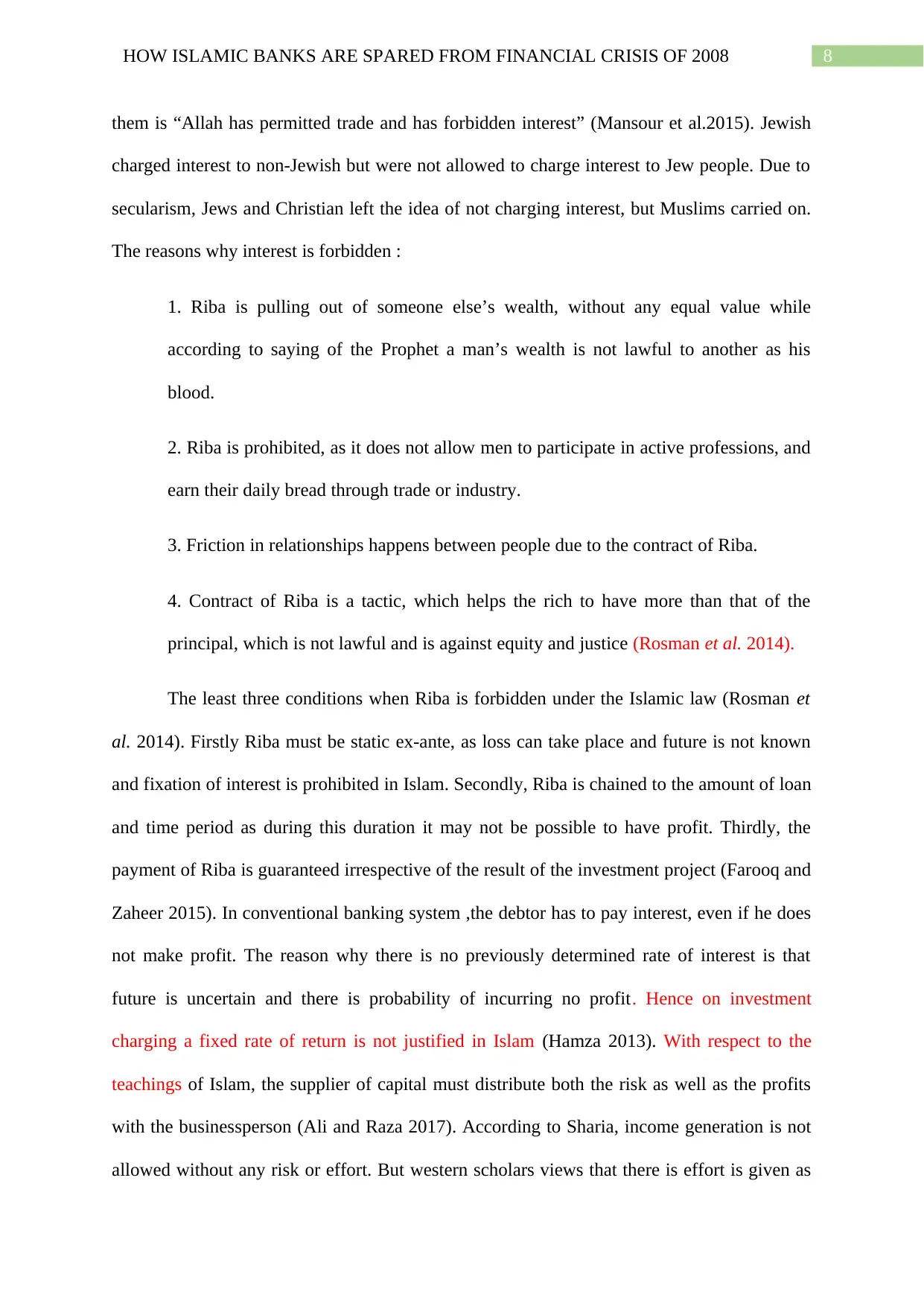
8HOW ISLAMIC BANKS ARE SPARED FROM FINANCIAL CRISIS OF 2008
them is “Allah has permitted trade and has forbidden interest” (Mansour et al.2015). Jewish
charged interest to non-Jewish but were not allowed to charge interest to Jew people. Due to
secularism, Jews and Christian left the idea of not charging interest, but Muslims carried on.
The reasons why interest is forbidden :
1. Riba is pulling out of someone else’s wealth, without any equal value while
according to saying of the Prophet a man’s wealth is not lawful to another as his
blood.
2. Riba is prohibited, as it does not allow men to participate in active professions, and
earn their daily bread through trade or industry.
3. Friction in relationships happens between people due to the contract of Riba.
4. Contract of Riba is a tactic, which helps the rich to have more than that of the
principal, which is not lawful and is against equity and justice (Rosman et al. 2014).
The least three conditions when Riba is forbidden under the Islamic law (Rosman et
al. 2014). Firstly Riba must be static ex-ante, as loss can take place and future is not known
and fixation of interest is prohibited in Islam. Secondly, Riba is chained to the amount of loan
and time period as during this duration it may not be possible to have profit. Thirdly, the
payment of Riba is guaranteed irrespective of the result of the investment project (Farooq and
Zaheer 2015). In conventional banking system ,the debtor has to pay interest, even if he does
not make profit. The reason why there is no previously determined rate of interest is that
future is uncertain and there is probability of incurring no profit. Hence on investment
charging a fixed rate of return is not justified in Islam (Hamza 2013). With respect to the
teachings of Islam, the supplier of capital must distribute both the risk as well as the profits
with the businessperson (Ali and Raza 2017). According to Sharia, income generation is not
allowed without any risk or effort. But western scholars views that there is effort is given as
them is “Allah has permitted trade and has forbidden interest” (Mansour et al.2015). Jewish
charged interest to non-Jewish but were not allowed to charge interest to Jew people. Due to
secularism, Jews and Christian left the idea of not charging interest, but Muslims carried on.
The reasons why interest is forbidden :
1. Riba is pulling out of someone else’s wealth, without any equal value while
according to saying of the Prophet a man’s wealth is not lawful to another as his
blood.
2. Riba is prohibited, as it does not allow men to participate in active professions, and
earn their daily bread through trade or industry.
3. Friction in relationships happens between people due to the contract of Riba.
4. Contract of Riba is a tactic, which helps the rich to have more than that of the
principal, which is not lawful and is against equity and justice (Rosman et al. 2014).
The least three conditions when Riba is forbidden under the Islamic law (Rosman et
al. 2014). Firstly Riba must be static ex-ante, as loss can take place and future is not known
and fixation of interest is prohibited in Islam. Secondly, Riba is chained to the amount of loan
and time period as during this duration it may not be possible to have profit. Thirdly, the
payment of Riba is guaranteed irrespective of the result of the investment project (Farooq and
Zaheer 2015). In conventional banking system ,the debtor has to pay interest, even if he does
not make profit. The reason why there is no previously determined rate of interest is that
future is uncertain and there is probability of incurring no profit. Hence on investment
charging a fixed rate of return is not justified in Islam (Hamza 2013). With respect to the
teachings of Islam, the supplier of capital must distribute both the risk as well as the profits
with the businessperson (Ali and Raza 2017). According to Sharia, income generation is not
allowed without any risk or effort. But western scholars views that there is effort is given as
⊘ This is a preview!⊘
Do you want full access?
Subscribe today to unlock all pages.

Trusted by 1+ million students worldwide
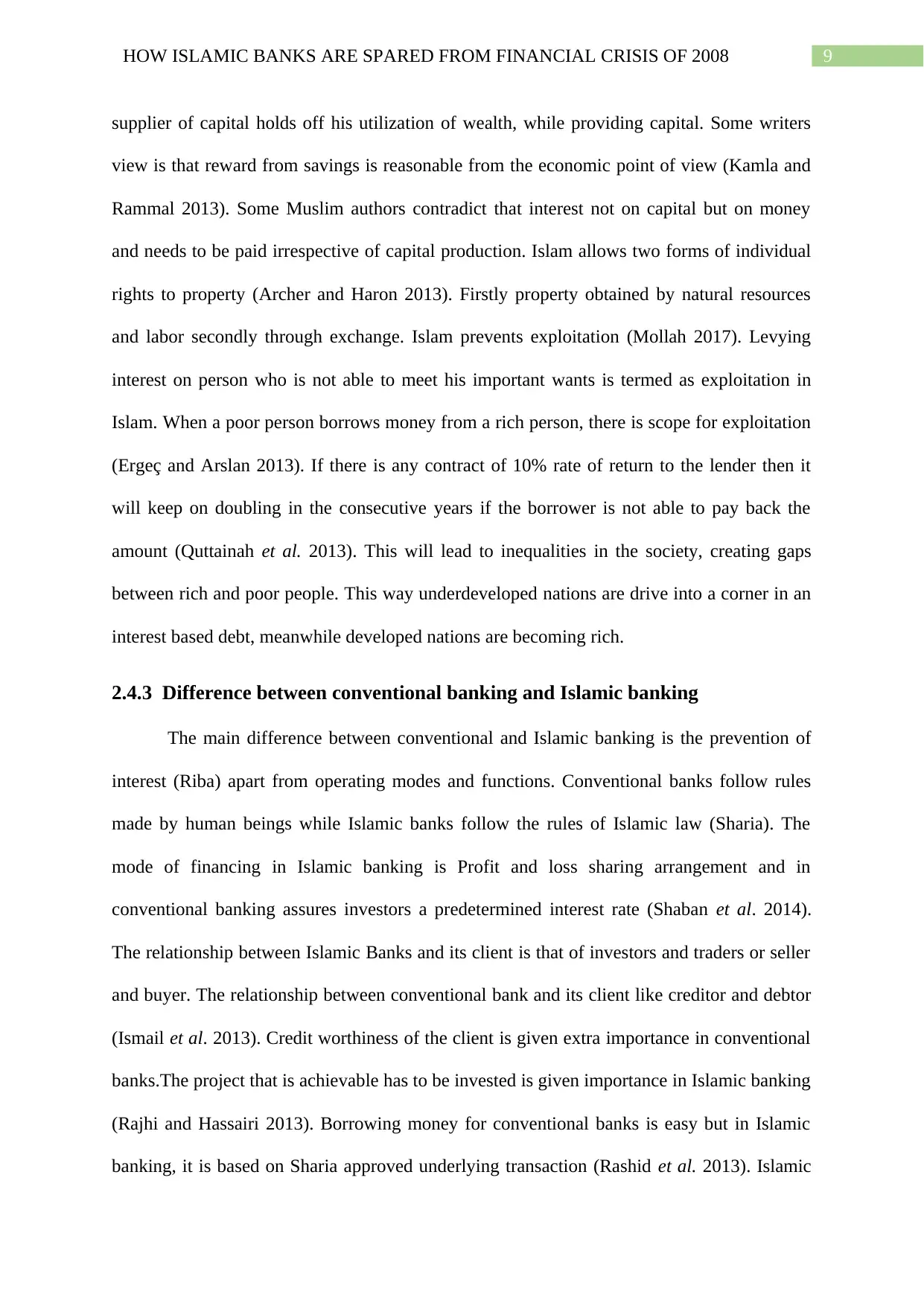
9HOW ISLAMIC BANKS ARE SPARED FROM FINANCIAL CRISIS OF 2008
supplier of capital holds off his utilization of wealth, while providing capital. Some writers
view is that reward from savings is reasonable from the economic point of view (Kamla and
Rammal 2013). Some Muslim authors contradict that interest not on capital but on money
and needs to be paid irrespective of capital production. Islam allows two forms of individual
rights to property (Archer and Haron 2013). Firstly property obtained by natural resources
and labor secondly through exchange. Islam prevents exploitation (Mollah 2017). Levying
interest on person who is not able to meet his important wants is termed as exploitation in
Islam. When a poor person borrows money from a rich person, there is scope for exploitation
(Ergeç and Arslan 2013). If there is any contract of 10% rate of return to the lender then it
will keep on doubling in the consecutive years if the borrower is not able to pay back the
amount (Quttainah et al. 2013). This will lead to inequalities in the society, creating gaps
between rich and poor people. This way underdeveloped nations are drive into a corner in an
interest based debt, meanwhile developed nations are becoming rich.
2.4.3 Difference between conventional banking and Islamic banking
The main difference between conventional and Islamic banking is the prevention of
interest (Riba) apart from operating modes and functions. Conventional banks follow rules
made by human beings while Islamic banks follow the rules of Islamic law (Sharia). The
mode of financing in Islamic banking is Profit and loss sharing arrangement and in
conventional banking assures investors a predetermined interest rate (Shaban et al. 2014).
The relationship between Islamic Banks and its client is that of investors and traders or seller
and buyer. The relationship between conventional bank and its client like creditor and debtor
(Ismail et al. 2013). Credit worthiness of the client is given extra importance in conventional
banks.The project that is achievable has to be invested is given importance in Islamic banking
(Rajhi and Hassairi 2013). Borrowing money for conventional banks is easy but in Islamic
banking, it is based on Sharia approved underlying transaction (Rashid et al. 2013). Islamic
supplier of capital holds off his utilization of wealth, while providing capital. Some writers
view is that reward from savings is reasonable from the economic point of view (Kamla and
Rammal 2013). Some Muslim authors contradict that interest not on capital but on money
and needs to be paid irrespective of capital production. Islam allows two forms of individual
rights to property (Archer and Haron 2013). Firstly property obtained by natural resources
and labor secondly through exchange. Islam prevents exploitation (Mollah 2017). Levying
interest on person who is not able to meet his important wants is termed as exploitation in
Islam. When a poor person borrows money from a rich person, there is scope for exploitation
(Ergeç and Arslan 2013). If there is any contract of 10% rate of return to the lender then it
will keep on doubling in the consecutive years if the borrower is not able to pay back the
amount (Quttainah et al. 2013). This will lead to inequalities in the society, creating gaps
between rich and poor people. This way underdeveloped nations are drive into a corner in an
interest based debt, meanwhile developed nations are becoming rich.
2.4.3 Difference between conventional banking and Islamic banking
The main difference between conventional and Islamic banking is the prevention of
interest (Riba) apart from operating modes and functions. Conventional banks follow rules
made by human beings while Islamic banks follow the rules of Islamic law (Sharia). The
mode of financing in Islamic banking is Profit and loss sharing arrangement and in
conventional banking assures investors a predetermined interest rate (Shaban et al. 2014).
The relationship between Islamic Banks and its client is that of investors and traders or seller
and buyer. The relationship between conventional bank and its client like creditor and debtor
(Ismail et al. 2013). Credit worthiness of the client is given extra importance in conventional
banks.The project that is achievable has to be invested is given importance in Islamic banking
(Rajhi and Hassairi 2013). Borrowing money for conventional banks is easy but in Islamic
banking, it is based on Sharia approved underlying transaction (Rashid et al. 2013). Islamic
Paraphrase This Document
Need a fresh take? Get an instant paraphrase of this document with our AI Paraphraser
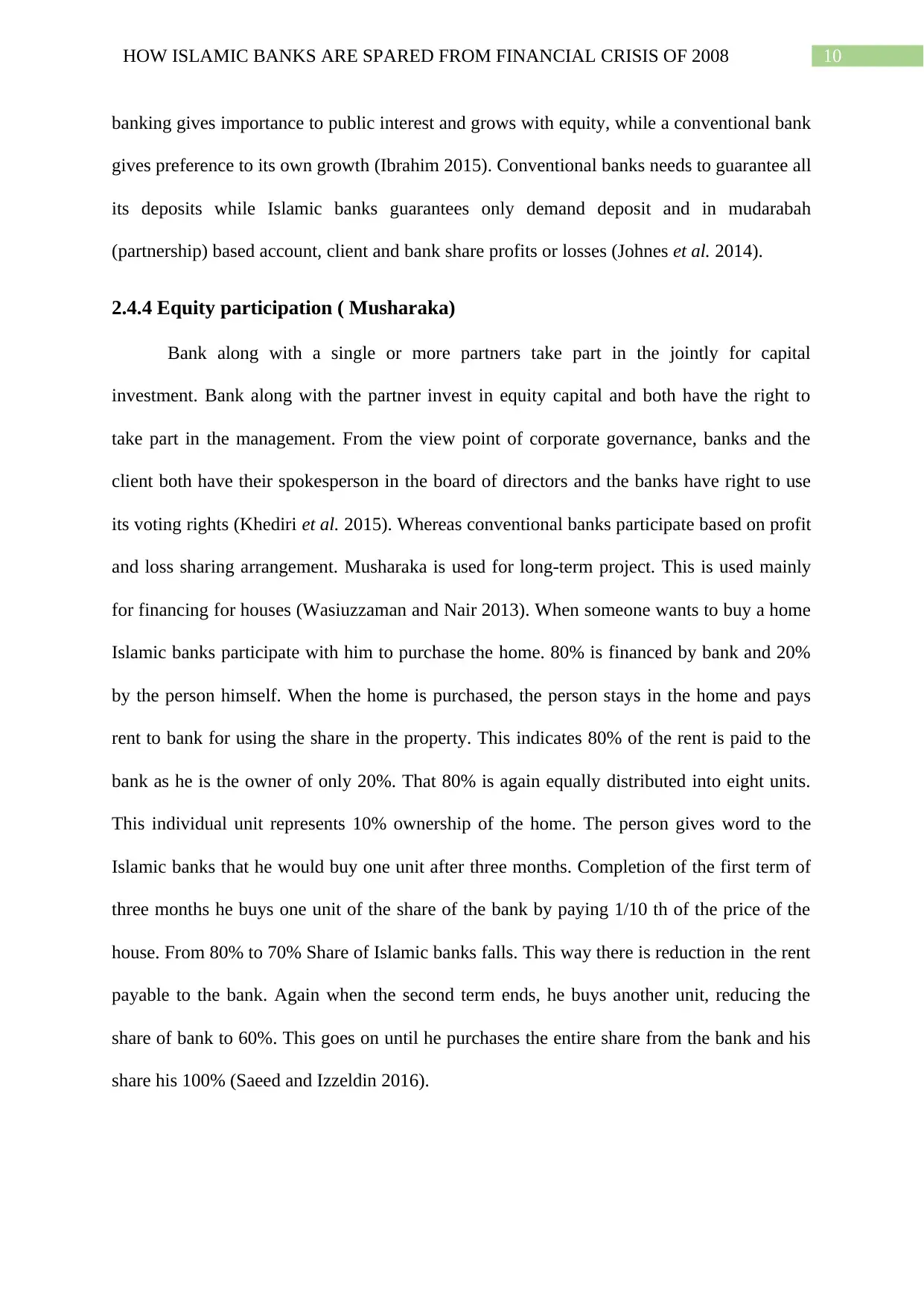
10HOW ISLAMIC BANKS ARE SPARED FROM FINANCIAL CRISIS OF 2008
banking gives importance to public interest and grows with equity, while a conventional bank
gives preference to its own growth (Ibrahim 2015). Conventional banks needs to guarantee all
its deposits while Islamic banks guarantees only demand deposit and in mudarabah
(partnership) based account, client and bank share profits or losses (Johnes et al. 2014).
2.4.4 Equity participation ( Musharaka)
Bank along with a single or more partners take part in the jointly for capital
investment. Bank along with the partner invest in equity capital and both have the right to
take part in the management. From the view point of corporate governance, banks and the
client both have their spokesperson in the board of directors and the banks have right to use
its voting rights (Khediri et al. 2015). Whereas conventional banks participate based on profit
and loss sharing arrangement. Musharaka is used for long-term project. This is used mainly
for financing for houses (Wasiuzzaman and Nair 2013). When someone wants to buy a home
Islamic banks participate with him to purchase the home. 80% is financed by bank and 20%
by the person himself. When the home is purchased, the person stays in the home and pays
rent to bank for using the share in the property. This indicates 80% of the rent is paid to the
bank as he is the owner of only 20%. That 80% is again equally distributed into eight units.
This individual unit represents 10% ownership of the home. The person gives word to the
Islamic banks that he would buy one unit after three months. Completion of the first term of
three months he buys one unit of the share of the bank by paying 1/10 th of the price of the
house. From 80% to 70% Share of Islamic banks falls. This way there is reduction in the rent
payable to the bank. Again when the second term ends, he buys another unit, reducing the
share of bank to 60%. This goes on until he purchases the entire share from the bank and his
share his 100% (Saeed and Izzeldin 2016).
banking gives importance to public interest and grows with equity, while a conventional bank
gives preference to its own growth (Ibrahim 2015). Conventional banks needs to guarantee all
its deposits while Islamic banks guarantees only demand deposit and in mudarabah
(partnership) based account, client and bank share profits or losses (Johnes et al. 2014).
2.4.4 Equity participation ( Musharaka)
Bank along with a single or more partners take part in the jointly for capital
investment. Bank along with the partner invest in equity capital and both have the right to
take part in the management. From the view point of corporate governance, banks and the
client both have their spokesperson in the board of directors and the banks have right to use
its voting rights (Khediri et al. 2015). Whereas conventional banks participate based on profit
and loss sharing arrangement. Musharaka is used for long-term project. This is used mainly
for financing for houses (Wasiuzzaman and Nair 2013). When someone wants to buy a home
Islamic banks participate with him to purchase the home. 80% is financed by bank and 20%
by the person himself. When the home is purchased, the person stays in the home and pays
rent to bank for using the share in the property. This indicates 80% of the rent is paid to the
bank as he is the owner of only 20%. That 80% is again equally distributed into eight units.
This individual unit represents 10% ownership of the home. The person gives word to the
Islamic banks that he would buy one unit after three months. Completion of the first term of
three months he buys one unit of the share of the bank by paying 1/10 th of the price of the
house. From 80% to 70% Share of Islamic banks falls. This way there is reduction in the rent
payable to the bank. Again when the second term ends, he buys another unit, reducing the
share of bank to 60%. This goes on until he purchases the entire share from the bank and his
share his 100% (Saeed and Izzeldin 2016).
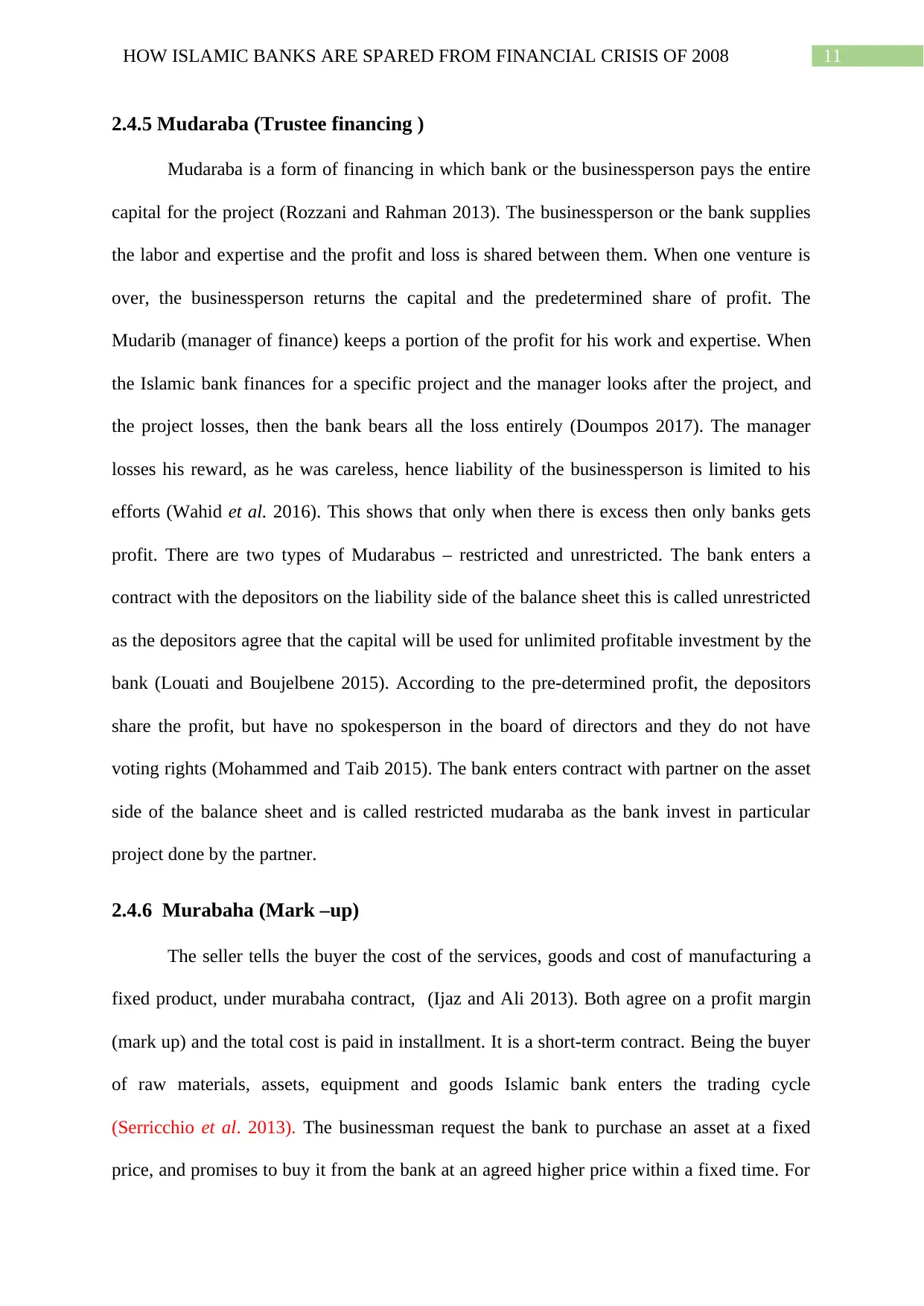
11HOW ISLAMIC BANKS ARE SPARED FROM FINANCIAL CRISIS OF 2008
2.4.5 Mudaraba (Trustee financing )
Mudaraba is a form of financing in which bank or the businessperson pays the entire
capital for the project (Rozzani and Rahman 2013). The businessperson or the bank supplies
the labor and expertise and the profit and loss is shared between them. When one venture is
over, the businessperson returns the capital and the predetermined share of profit. The
Mudarib (manager of finance) keeps a portion of the profit for his work and expertise. When
the Islamic bank finances for a specific project and the manager looks after the project, and
the project losses, then the bank bears all the loss entirely (Doumpos 2017). The manager
losses his reward, as he was careless, hence liability of the businessperson is limited to his
efforts (Wahid et al. 2016). This shows that only when there is excess then only banks gets
profit. There are two types of Mudarabus – restricted and unrestricted. The bank enters a
contract with the depositors on the liability side of the balance sheet this is called unrestricted
as the depositors agree that the capital will be used for unlimited profitable investment by the
bank (Louati and Boujelbene 2015). According to the pre-determined profit, the depositors
share the profit, but have no spokesperson in the board of directors and they do not have
voting rights (Mohammed and Taib 2015). The bank enters contract with partner on the asset
side of the balance sheet and is called restricted mudaraba as the bank invest in particular
project done by the partner.
2.4.6 Murabaha (Mark –up)
The seller tells the buyer the cost of the services, goods and cost of manufacturing a
fixed product, under murabaha contract, (Ijaz and Ali 2013). Both agree on a profit margin
(mark up) and the total cost is paid in installment. It is a short-term contract. Being the buyer
of raw materials, assets, equipment and goods Islamic bank enters the trading cycle
(Serricchio et al. 2013). The businessman request the bank to purchase an asset at a fixed
price, and promises to buy it from the bank at an agreed higher price within a fixed time. For
2.4.5 Mudaraba (Trustee financing )
Mudaraba is a form of financing in which bank or the businessperson pays the entire
capital for the project (Rozzani and Rahman 2013). The businessperson or the bank supplies
the labor and expertise and the profit and loss is shared between them. When one venture is
over, the businessperson returns the capital and the predetermined share of profit. The
Mudarib (manager of finance) keeps a portion of the profit for his work and expertise. When
the Islamic bank finances for a specific project and the manager looks after the project, and
the project losses, then the bank bears all the loss entirely (Doumpos 2017). The manager
losses his reward, as he was careless, hence liability of the businessperson is limited to his
efforts (Wahid et al. 2016). This shows that only when there is excess then only banks gets
profit. There are two types of Mudarabus – restricted and unrestricted. The bank enters a
contract with the depositors on the liability side of the balance sheet this is called unrestricted
as the depositors agree that the capital will be used for unlimited profitable investment by the
bank (Louati and Boujelbene 2015). According to the pre-determined profit, the depositors
share the profit, but have no spokesperson in the board of directors and they do not have
voting rights (Mohammed and Taib 2015). The bank enters contract with partner on the asset
side of the balance sheet and is called restricted mudaraba as the bank invest in particular
project done by the partner.
2.4.6 Murabaha (Mark –up)
The seller tells the buyer the cost of the services, goods and cost of manufacturing a
fixed product, under murabaha contract, (Ijaz and Ali 2013). Both agree on a profit margin
(mark up) and the total cost is paid in installment. It is a short-term contract. Being the buyer
of raw materials, assets, equipment and goods Islamic bank enters the trading cycle
(Serricchio et al. 2013). The businessman request the bank to purchase an asset at a fixed
price, and promises to buy it from the bank at an agreed higher price within a fixed time. For
⊘ This is a preview!⊘
Do you want full access?
Subscribe today to unlock all pages.

Trusted by 1+ million students worldwide
1 out of 30
Related Documents
Your All-in-One AI-Powered Toolkit for Academic Success.
+13062052269
info@desklib.com
Available 24*7 on WhatsApp / Email
![[object Object]](/_next/static/media/star-bottom.7253800d.svg)
Unlock your academic potential
Copyright © 2020–2026 A2Z Services. All Rights Reserved. Developed and managed by ZUCOL.





